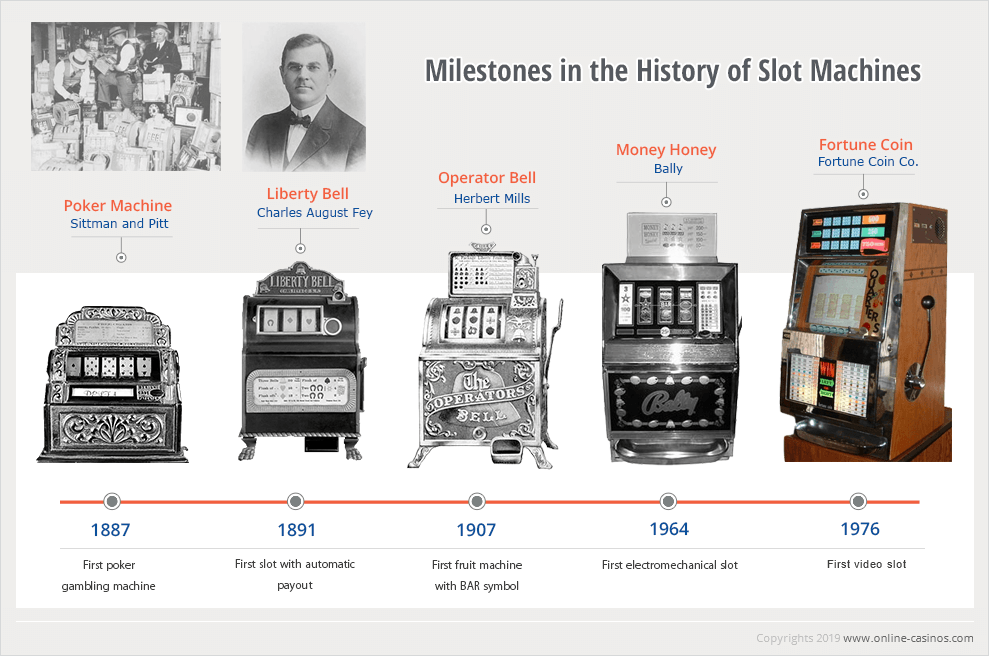Canada
History of Slot Games

Slot machines are easily one of the world’s most recognizable and iconic forms of gambling. Because of this, it is estimated that almost 1.8 million slot machines are active in casinos around the globe.
Like anything else, however, slots were not always this popular. From a humble beginning, they have grown in complexity, ingenuity, and entertainment value over the years. This has been especially true since the advent of online slots – the best of which you can find on visit slotsource.com.
To trace back the origins of these great gambling machines, we’ve outlined the history of the slot. So, read on to see how your favorite gambling medium grew to be what it is today.
The Idea of Slots
While technically it is a slot machine, the first ever slot is not considered actually to be one by most people. This is because the machine, invented in 1891 by Sittman and Pitt in New York, didn’t pay out any cash. Instead, all prizes were paid out in free drinks or cigars. This makes sense because these machines were mainly found in pubs and bars.
The machine was relatively simple and gave the main idea from which modern slot machines evolved. The slot had five drums used to play. These drums rotated on a central pin until a lever was used to activate a stopping mechanism, which stopped the drums one at a time. This lever is what is credited for the nickname one-armed bandit.
Each drum held ten cards from a standard playing deck totaling 50 cards. The only cards missing from this deck were the ten of spades and the jack of hearts. The reason for excluding these cards was to increase the house edge and give players a lower chance of winning.
The First Slot
Building on the idea of Sittman and Pitt, Charles Fey began working on his version of a slot machine. Because it offered automatic payouts and, in later versions, even featured coin checkers to detect fake coins, Charles is credited with being the father of slot machines and first released his invention in 1895.
After using bells as a symbol in the game, his machine (called the Liberty Bell) only featured three reels rather than the five of Sittman and Pitt. It also didn’t feature any cards. Instead, it used hearts, diamonds, spades, horseshoes, and the iconic liberty bell.
The reduced reels and symbols made it easier for the machine to detect a win and pay out accordingly. However, while the machine was hugely popular, Fey forgot to patent his design. Because of this, other producers quickly began cloning the machine and flooding the market.
Due to the influx of machines and the popularity of gambling, the government decided to take action. So, in 1902, gambling was officially outlawed. However, slot manufacturers found a unique way around the ban rather than curbing the problem.
Machines were designed to offer payouts of prizes like candy or other treats rather than money. These offered people the same thrill of gambling but ensured they only received something they could snack on rather than cash. During this era, a manufacturer called Herbert Mills produced the first ever machine using fruit symbols, which are still widely used today.
The Electrical Slot Revolution
By 1964, many companies were trying to develop the next big slot machine. This development was accelerated because gambling was seen as more acceptable, and the laws regarding the activity were beginning to soften. No company made as much progress, however, as Bally.
Bally is credited with inventing the first ever electromechanical slot machine. This machine, titled Money Honey, featured fully electric reels that could pay out up to 500 coins — a feat no other slot could boast. Even though the machine was electric, the trusted lever was still present, as it was thought that removing it would throw off people from what they had been used to doing.
The release of Money Honey sparked a new era in slots, and soon many other companies began producing fully electric slot machines. During the evolution of the machines, the popular lever used was abandoned in favor of a simple button.
Slots continued in much the same vein until 1976, when something new blew the industry wide open.
Video Slots
In 1976, after many years of much of the same, a company called Fortune Coin (which would later be bought by IGT) produced the world’s first video slot machine. The game used a TV screen display and a random number generator that strongly resembles today’s slot machines.
After initial testing in Vegas, the machine grew massively in popularity, and video slots became the norm worldwide. Then, in 1996, the industry was again shaken up by the introduction of the first slot that also had a bonus round.
Adding a bonus to games made slots the most popular form of gaming by far. As such, slots began taking over most space in physical casinos. At the same time, online slots started making an appearance in the library of online casinos.
Online Slots and Onward
While the first online casinos, which appeared in the late 90s, usually only offered games like roulette, slots soon began making their way into many different casino game libraries. Their popularity soon caught on like wildfire, and many developers started looking to develop the next great game in earnest.
Soon, online slots took on a life of their own and were no longer developed to emulate the games offered in physical casinos. Instead, because of the freedom to be creative, developers began producing many unique and wonderful games that accelerated the popularity of gambling online.
Since then, online slots have become an almost unbelievably big industry. The online gambling market, worth $61.5 billion in 2021, is said to be comprised of as much as 70% slots. This means that of this massive amount, slot games alone generate almost $43.05 billion.
This growth means that slots have continued to grow and are still actively being developed. Today, work is underway to adapt slots to virtual and augmented reality to try and discover the next great leap in the evolution of this gambling icon.
Powered by WPeMatico
Canada
St8 launches in Ontario through partnership with Tonybet

Casino games aggregator and full-service technology provider, St8 has officially gone live in Ontario’s regulated market through a new partnership with international brand Tonybet.
Through the partnership, Tonybet gains access to St8’s casino games aggregation platform, offering a wide range of premium titles from leading providers through a single API, alongside bonusing and promotional tools, compliance and licensing solutions, advanced reporting and data capabilities.
Built as a single scalable platform, St8’s products are designed to help operators launch and grow across regulated markets with fast, flexible technology solutions while maintaining full compliance.
The agreement marks a further step in St8’s global growth strategy as the company continues to expand its presence across regulated jurisdictions.
Vladimir Negine, CEO at St8, said: “Going live in Ontario is an important milestone for St8 and reflects our continued commitment to growth in regulated markets. Since receiving our Ontario licence, we have focused on building strong local partnerships and delivering a platform that combines scalability, speed and compliance.
“As a respected international brand, Tonybet shares our commitment to building reliable solutions for regulated markets, and we look forward to working closely together as we continue to expand our presence in regulated jurisdictions worldwide.”
Kiryl Liudvikevich, Head of Product at Tonybet, added: “As we expand our presence in Ontario, it is important for us to work with technology partners that support continued growth while meeting the highest regulatory standards.
“St8’s platform gives us the flexibility to integrate a wide range of content and tools through a single connection, helping us scale smoothly while maintaining a strong focus on player experience.”
St8 continues to lead the way as a partner of choice for regulated markets. In addition to its Ontario licence, the company holds licences in key regulated jurisdictions like the United Kingdom, Sweden and Romania, among others.
The post St8 launches in Ontario through partnership with Tonybet appeared first on Americas iGaming & Sports Betting News.
Canada
Rivalry Corp. Announces Significant Reduction in Operations and Evaluation of Strategic Alternatives

Rivalry Corp. announced that its Board of Directors has approved a significant reduction in operating activity as the Company evaluates strategic alternatives in respect of its assets and operations.
The Company is engaged in discussions with third parties regarding potential transactions. However, in light of recent performance volatility, the Board has determined to materially reduce the scale of operations while assessing whether a strategic transaction or other alternative can be advanced.
Effective immediately, the Company is implementing substantial cost reductions, including a significant workforce reduction and reduced operating expenditures. The Company has paused player activity on its platform and is facilitating player withdrawals in the ordinary course.
The Company is assessing a range of potential alternatives, which may include asset-level transactions, corporate transactions, restructuring initiatives or other strategic outcomes.
Given the Company’s reduced operating scale and the ongoing evaluation process, there can be no assurance that any strategic alternative will be completed or that operations will continue in their current form.
The post Rivalry Corp. Announces Significant Reduction in Operations and Evaluation of Strategic Alternatives appeared first on Americas iGaming & Sports Betting News.
Alex Malchenko
Evoplay Strengthens Canadian Presence with BetMGM Partnership

Evoplay is celebrating another milestone in its regulated-market journey with a new launch in Ontario, teaming up with BetMGM to bring its games to one of Canada’s most dynamic and competitive jurisdictions.
The rollout introduces 18 Evoplay titles to BetMGM Casino in Ontario, carefully selected to deliver long-term engagement and appeal to a wide range of player preferences. The first wave includes proven performers such as:
• Hot Triple Sevens
• Hot Volcano
• Gold of Sirens Bonus Buy
• Inner Fire Bonus Buy.
These are games that have already demonstrated strong results across multiple regulated markets.
This launch marks another confident step in Evoplay’s Canadian expansion, reinforcing the company’s commitment to aligning its content with local market requirements, player expectations, and regulatory standards.
Alex Malchenko, Head of Sales at Evoplay, said: Ontario continues to set a high standard for regulated online casinos, making it a market where the right partnerships truly matter. Collaborating with BetMGM allows us to expand our reach with a portfolio that has already performed strongly across multiple areas and territories.
Oliver Bartlett, VP of Gaming at BetMGM, said: “Partnering with Evoplay adds a strong selection of proven, high-performing titles to our growing portfolio in Ontario.”
The post Evoplay Strengthens Canadian Presence with BetMGM Partnership appeared first on Americas iGaming & Sports Betting News.
-

 ACMA7 days ago
ACMA7 days agoACMA Blocks More Illegal Online Gambling Websites
-

 CEO of GGBET UA Serhii Mishchenko7 days ago
CEO of GGBET UA Serhii Mishchenko7 days agoGGBET UA kicks off the “Keep it GG” promotional campaign
-

 Aurimas Šilys7 days ago
Aurimas Šilys7 days agoREEVO Partners with Betsson Lithuania
-

 Latest News6 days ago
Latest News6 days agoTRUEiGTECH Unveils Enterprise-Grade Prediction Market Platform for Operators
-

 Central Europe7 days ago
Central Europe7 days agoNOVOMATIC Once Again Recognised as an “Austrian Leading Company”
-

 Canada6 days ago
Canada6 days agoRivalry Corp. Announces Significant Reduction in Operations and Evaluation of Strategic Alternatives
-

 Acquisitions/Merger6 days ago
Acquisitions/Merger6 days agoBoonuspart Acquires Kasiino-boonus to Strengthen its Position in the Estonian iGaming Market
-

 Firecracker Frenzy™ Money Toad™6 days ago
Firecracker Frenzy™ Money Toad™6 days agoAncient fortune explodes to life in Greentube’s Firecracker Frenzy™: Money Toad™



















